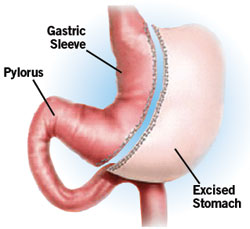Sleeve Gastrectomy
 Laparoscopic Sleeve Gastrectomy is a purely restrictive procedure that reduces the size of the stomach. As a result, patients feel full and satisfied after eating a small amount of food. There are also significant effects on the hunger mechanisms. Hunger is favorably affected because there is a reduced capacity to produce Ghrelin, a substance that plays a role in how you feel and relieve hunger. This procedure does carry with it a risk of postoperative complications similar to a bypass, with the exception being a minimal risk of “dumping syndrome.”
Laparoscopic Sleeve Gastrectomy is a purely restrictive procedure that reduces the size of the stomach. As a result, patients feel full and satisfied after eating a small amount of food. There are also significant effects on the hunger mechanisms. Hunger is favorably affected because there is a reduced capacity to produce Ghrelin, a substance that plays a role in how you feel and relieve hunger. This procedure does carry with it a risk of postoperative complications similar to a bypass, with the exception being a minimal risk of “dumping syndrome.”
Interestingly, all Type II diabetes patients that undergo a gastric bypass experience immediate improvement in their condition. For Type II diabetics who receive a band or sleeve gastrectomy, improvement in their condition is not realized until the weight loss commences. Although not well understood, this is believed to be due to an endocrinologic mechanism.
Procedure
A two-stage procedure is performed: the first is a sleeve gastrectomy, and the second is a conversion into a gastric bypass or duodenal switch. Patients usually lose a large quantity of their excess weight after the first sleeve gastrectomy procedure alone, but if weight loss ceases the second step is performed. For patients that are obese but not extremely obese, sleeve gastrectomy alone is a suitable operation with minimum risks.
Advantages of Sleeve Gastrectomy
- Less invasive than gastric bypass
- No rerouting of the intestines
- Stomach empties normally into the small intestine
- Does not require an implanted device.
- Better for patients with prior surgery or medical conditions
- Fewer complications and malabsorption issues
- Little risk of “dumping syndrome,” a condition where ingested foods bypass the stomach too rapidly and enter the small intestine largely undigested
- Nutritional supplementation is not as great as with gastric bypass
- Rapid weight loss within a year
- Weight-loss greater than with gastric banding
- Weight-loss similar to gastric bypass
- Can be converted later to gastric bypass if desired
Risks associated with Sleeve Gastrectomy
- Leakage of the sleeve (stomach) leading to infection
- The stomach can stretch and weight may be regained over time
- Need for additional weight loss surgery
- Malabsorption
- Bleeding
- Blood clots (in legs or clots to lung)
- Anesthesia complications
- Death
Learn More About These Other Surgical Weight Loss Options:

Telephone No.(706) 882-8831


